The Role of Culture at Sainsbury's: Effectiveness and Motivation
VerifiedAdded on 2023/06/18
|17
|3457
|398
Report
AI Summary
This report provides an in-depth analysis of Sainsbury's organizational culture, focusing on how it enhances organizational effectiveness through communication and employee motivation. It identifies Sainsbury's culture using Handy's cultural model, highlighting the company's role culture where employees are given specific roles and responsibilities. The report evaluates how effective communication, including transactional analysis, fosters a positive working environment and improves employee engagement. Furthermore, it examines the role of culture in employee motivation, utilizing Maslow's hierarchy of needs to demonstrate how Sainsbury's addresses various employee needs to create a motivated workforce. The report concludes by emphasizing how Sainsbury's can leverage its culture to further enhance its success by fostering a supportive and empowering work environment.
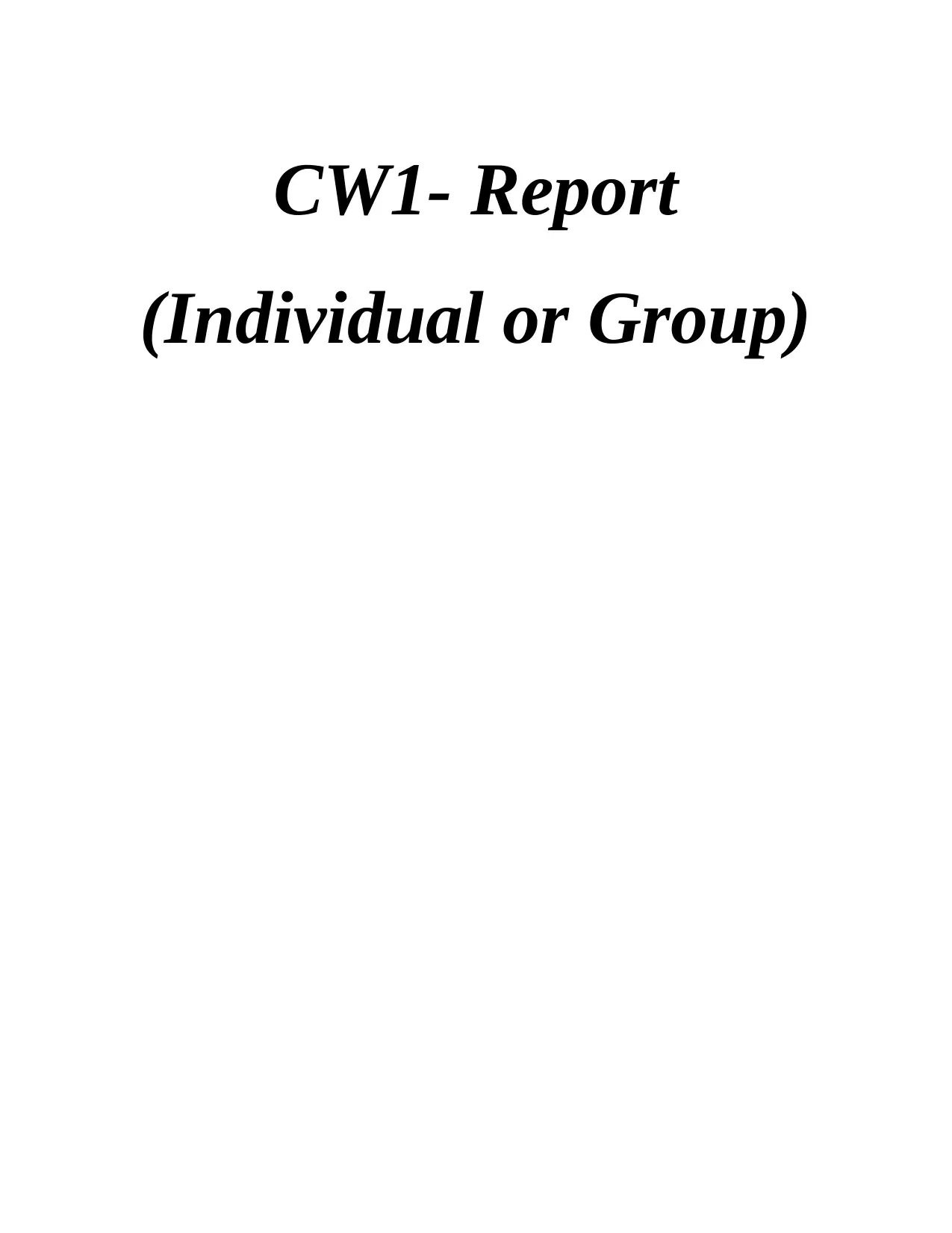
CW1- Report
(Individual or Group)
(Individual or Group)
Paraphrase This Document
Need a fresh take? Get an instant paraphrase of this document with our AI Paraphraser
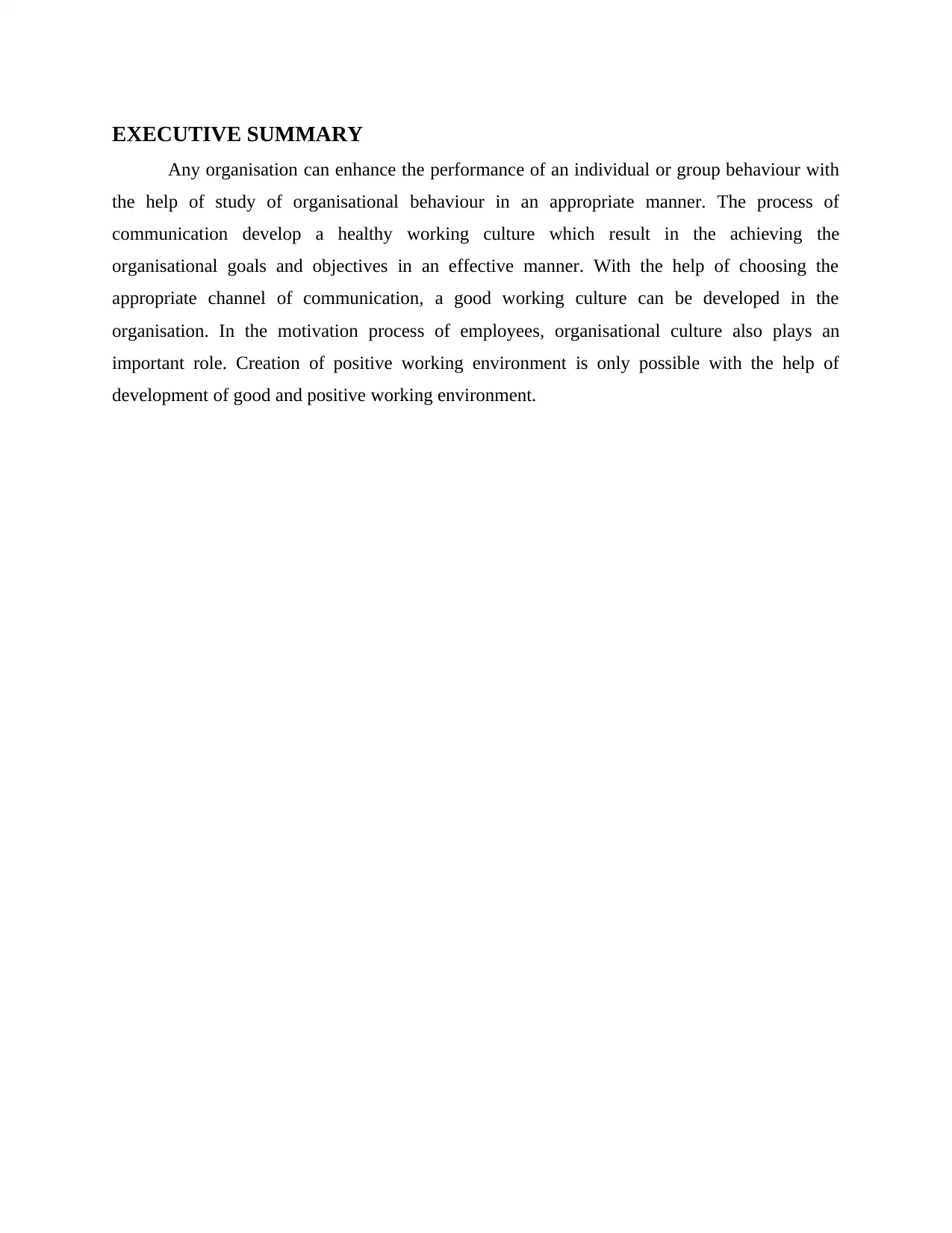
EXECUTIVE SUMMARY
Any organisation can enhance the performance of an individual or group behaviour with
the help of study of organisational behaviour in an appropriate manner. The process of
communication develop a healthy working culture which result in the achieving the
organisational goals and objectives in an effective manner. With the help of choosing the
appropriate channel of communication, a good working culture can be developed in the
organisation. In the motivation process of employees, organisational culture also plays an
important role. Creation of positive working environment is only possible with the help of
development of good and positive working environment.
Any organisation can enhance the performance of an individual or group behaviour with
the help of study of organisational behaviour in an appropriate manner. The process of
communication develop a healthy working culture which result in the achieving the
organisational goals and objectives in an effective manner. With the help of choosing the
appropriate channel of communication, a good working culture can be developed in the
organisation. In the motivation process of employees, organisational culture also plays an
important role. Creation of positive working environment is only possible with the help of
development of good and positive working environment.
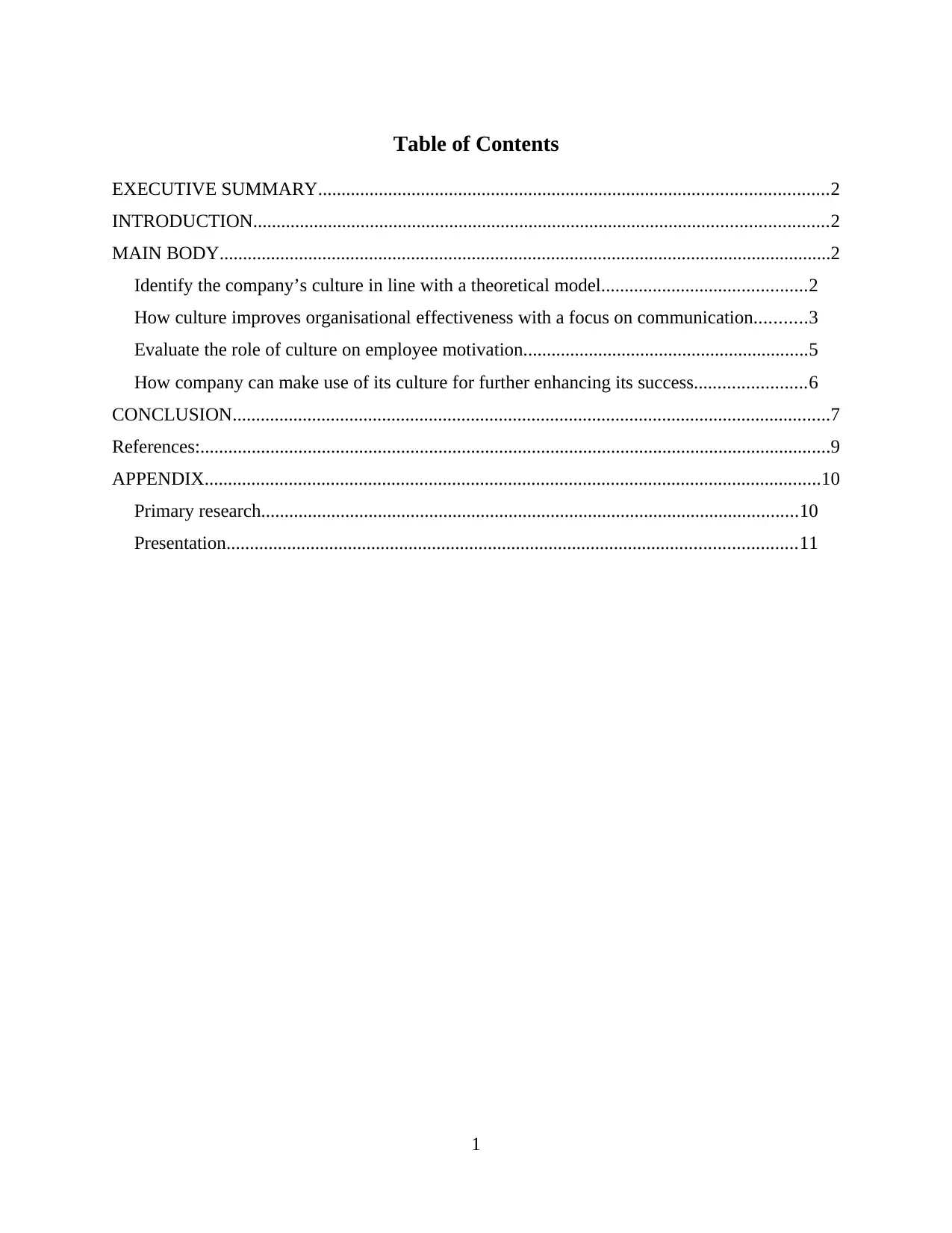
Table of Contents
EXECUTIVE SUMMARY.............................................................................................................2
INTRODUCTION...........................................................................................................................2
MAIN BODY...................................................................................................................................2
Identify the company’s culture in line with a theoretical model............................................2
How culture improves organisational effectiveness with a focus on communication...........3
Evaluate the role of culture on employee motivation.............................................................5
How company can make use of its culture for further enhancing its success........................6
CONCLUSION................................................................................................................................7
References:.......................................................................................................................................9
APPENDIX....................................................................................................................................10
Primary research...................................................................................................................10
Presentation..........................................................................................................................11
1
EXECUTIVE SUMMARY.............................................................................................................2
INTRODUCTION...........................................................................................................................2
MAIN BODY...................................................................................................................................2
Identify the company’s culture in line with a theoretical model............................................2
How culture improves organisational effectiveness with a focus on communication...........3
Evaluate the role of culture on employee motivation.............................................................5
How company can make use of its culture for further enhancing its success........................6
CONCLUSION................................................................................................................................7
References:.......................................................................................................................................9
APPENDIX....................................................................................................................................10
Primary research...................................................................................................................10
Presentation..........................................................................................................................11
1
⊘ This is a preview!⊘
Do you want full access?
Subscribe today to unlock all pages.

Trusted by 1+ million students worldwide
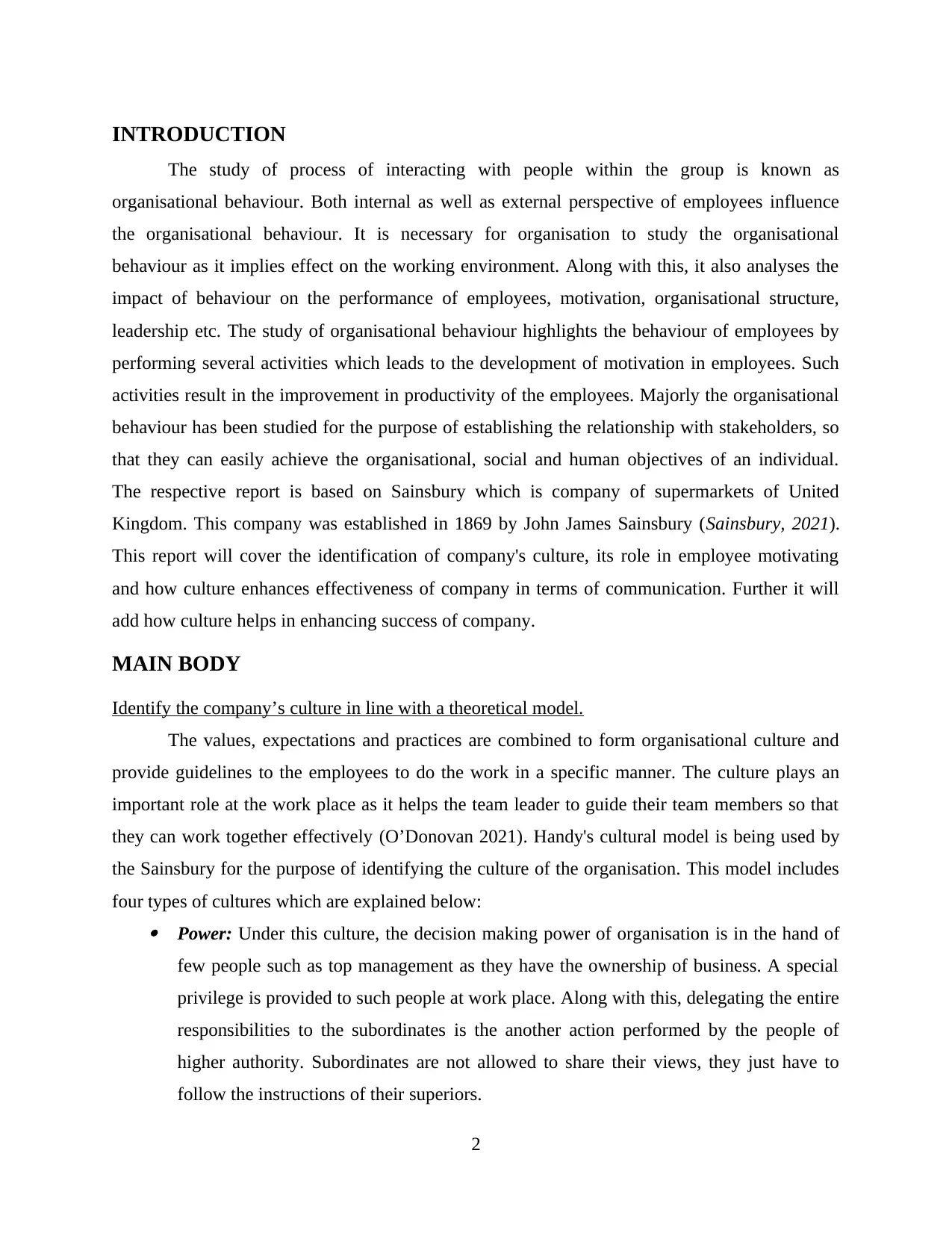
INTRODUCTION
The study of process of interacting with people within the group is known as
organisational behaviour. Both internal as well as external perspective of employees influence
the organisational behaviour. It is necessary for organisation to study the organisational
behaviour as it implies effect on the working environment. Along with this, it also analyses the
impact of behaviour on the performance of employees, motivation, organisational structure,
leadership etc. The study of organisational behaviour highlights the behaviour of employees by
performing several activities which leads to the development of motivation in employees. Such
activities result in the improvement in productivity of the employees. Majorly the organisational
behaviour has been studied for the purpose of establishing the relationship with stakeholders, so
that they can easily achieve the organisational, social and human objectives of an individual.
The respective report is based on Sainsbury which is company of supermarkets of United
Kingdom. This company was established in 1869 by John James Sainsbury (Sainsbury, 2021).
This report will cover the identification of company's culture, its role in employee motivating
and how culture enhances effectiveness of company in terms of communication. Further it will
add how culture helps in enhancing success of company.
MAIN BODY
Identify the company’s culture in line with a theoretical model.
The values, expectations and practices are combined to form organisational culture and
provide guidelines to the employees to do the work in a specific manner. The culture plays an
important role at the work place as it helps the team leader to guide their team members so that
they can work together effectively (O’Donovan 2021). Handy's cultural model is being used by
the Sainsbury for the purpose of identifying the culture of the organisation. This model includes
four types of cultures which are explained below: Power: Under this culture, the decision making power of organisation is in the hand of
few people such as top management as they have the ownership of business. A special
privilege is provided to such people at work place. Along with this, delegating the entire
responsibilities to the subordinates is the another action performed by the people of
higher authority. Subordinates are not allowed to share their views, they just have to
follow the instructions of their superiors.
2
The study of process of interacting with people within the group is known as
organisational behaviour. Both internal as well as external perspective of employees influence
the organisational behaviour. It is necessary for organisation to study the organisational
behaviour as it implies effect on the working environment. Along with this, it also analyses the
impact of behaviour on the performance of employees, motivation, organisational structure,
leadership etc. The study of organisational behaviour highlights the behaviour of employees by
performing several activities which leads to the development of motivation in employees. Such
activities result in the improvement in productivity of the employees. Majorly the organisational
behaviour has been studied for the purpose of establishing the relationship with stakeholders, so
that they can easily achieve the organisational, social and human objectives of an individual.
The respective report is based on Sainsbury which is company of supermarkets of United
Kingdom. This company was established in 1869 by John James Sainsbury (Sainsbury, 2021).
This report will cover the identification of company's culture, its role in employee motivating
and how culture enhances effectiveness of company in terms of communication. Further it will
add how culture helps in enhancing success of company.
MAIN BODY
Identify the company’s culture in line with a theoretical model.
The values, expectations and practices are combined to form organisational culture and
provide guidelines to the employees to do the work in a specific manner. The culture plays an
important role at the work place as it helps the team leader to guide their team members so that
they can work together effectively (O’Donovan 2021). Handy's cultural model is being used by
the Sainsbury for the purpose of identifying the culture of the organisation. This model includes
four types of cultures which are explained below: Power: Under this culture, the decision making power of organisation is in the hand of
few people such as top management as they have the ownership of business. A special
privilege is provided to such people at work place. Along with this, delegating the entire
responsibilities to the subordinates is the another action performed by the people of
higher authority. Subordinates are not allowed to share their views, they just have to
follow the instructions of their superiors.
2
Paraphrase This Document
Need a fresh take? Get an instant paraphrase of this document with our AI Paraphraser
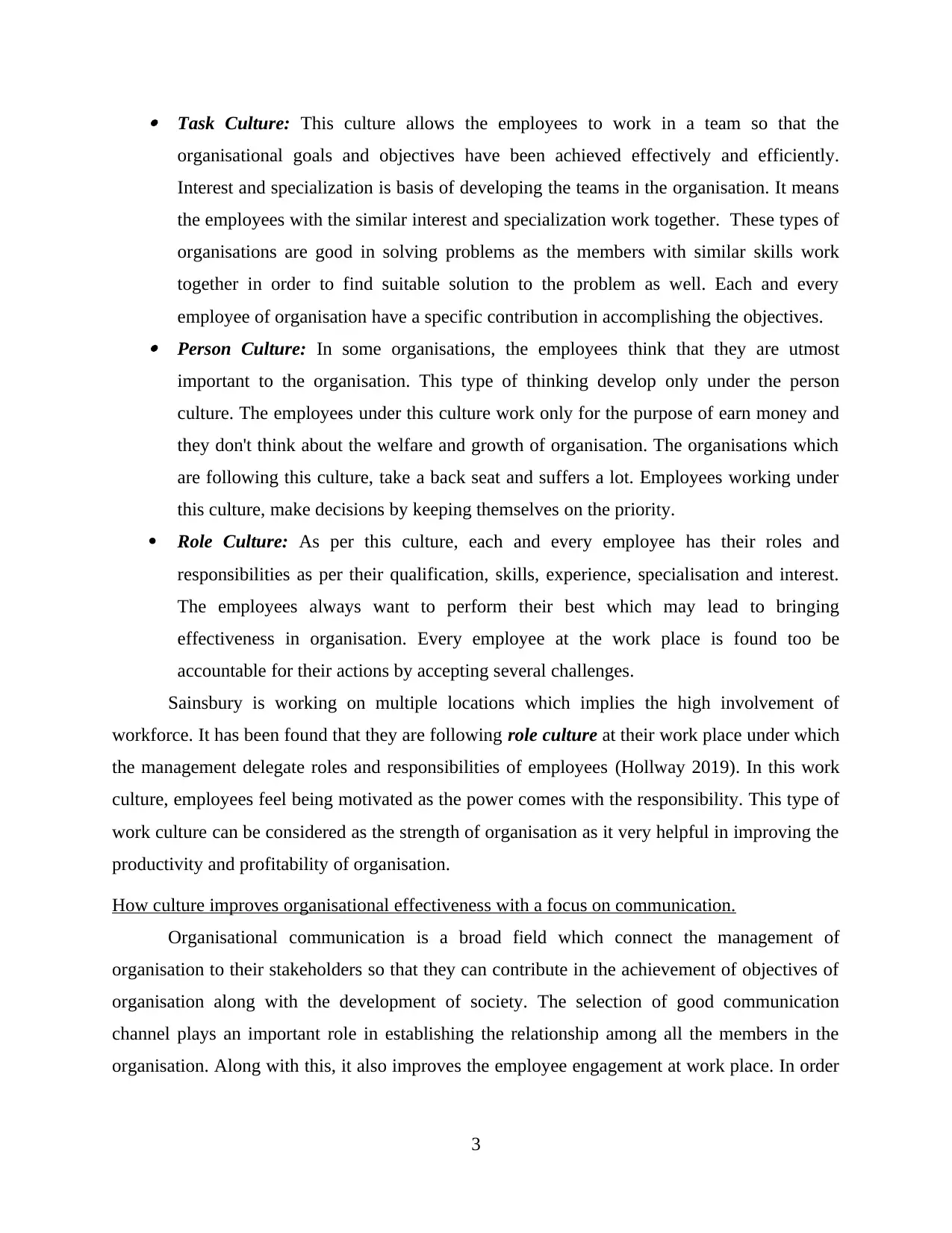
Task Culture: This culture allows the employees to work in a team so that the
organisational goals and objectives have been achieved effectively and efficiently.
Interest and specialization is basis of developing the teams in the organisation. It means
the employees with the similar interest and specialization work together. These types of
organisations are good in solving problems as the members with similar skills work
together in order to find suitable solution to the problem as well. Each and every
employee of organisation have a specific contribution in accomplishing the objectives. Person Culture: In some organisations, the employees think that they are utmost
important to the organisation. This type of thinking develop only under the person
culture. The employees under this culture work only for the purpose of earn money and
they don't think about the welfare and growth of organisation. The organisations which
are following this culture, take a back seat and suffers a lot. Employees working under
this culture, make decisions by keeping themselves on the priority.
Role Culture: As per this culture, each and every employee has their roles and
responsibilities as per their qualification, skills, experience, specialisation and interest.
The employees always want to perform their best which may lead to bringing
effectiveness in organisation. Every employee at the work place is found too be
accountable for their actions by accepting several challenges.
Sainsbury is working on multiple locations which implies the high involvement of
workforce. It has been found that they are following role culture at their work place under which
the management delegate roles and responsibilities of employees (Hollway 2019). In this work
culture, employees feel being motivated as the power comes with the responsibility. This type of
work culture can be considered as the strength of organisation as it very helpful in improving the
productivity and profitability of organisation.
How culture improves organisational effectiveness with a focus on communication.
Organisational communication is a broad field which connect the management of
organisation to their stakeholders so that they can contribute in the achievement of objectives of
organisation along with the development of society. The selection of good communication
channel plays an important role in establishing the relationship among all the members in the
organisation. Along with this, it also improves the employee engagement at work place. In order
3
organisational goals and objectives have been achieved effectively and efficiently.
Interest and specialization is basis of developing the teams in the organisation. It means
the employees with the similar interest and specialization work together. These types of
organisations are good in solving problems as the members with similar skills work
together in order to find suitable solution to the problem as well. Each and every
employee of organisation have a specific contribution in accomplishing the objectives. Person Culture: In some organisations, the employees think that they are utmost
important to the organisation. This type of thinking develop only under the person
culture. The employees under this culture work only for the purpose of earn money and
they don't think about the welfare and growth of organisation. The organisations which
are following this culture, take a back seat and suffers a lot. Employees working under
this culture, make decisions by keeping themselves on the priority.
Role Culture: As per this culture, each and every employee has their roles and
responsibilities as per their qualification, skills, experience, specialisation and interest.
The employees always want to perform their best which may lead to bringing
effectiveness in organisation. Every employee at the work place is found too be
accountable for their actions by accepting several challenges.
Sainsbury is working on multiple locations which implies the high involvement of
workforce. It has been found that they are following role culture at their work place under which
the management delegate roles and responsibilities of employees (Hollway 2019). In this work
culture, employees feel being motivated as the power comes with the responsibility. This type of
work culture can be considered as the strength of organisation as it very helpful in improving the
productivity and profitability of organisation.
How culture improves organisational effectiveness with a focus on communication.
Organisational communication is a broad field which connect the management of
organisation to their stakeholders so that they can contribute in the achievement of objectives of
organisation along with the development of society. The selection of good communication
channel plays an important role in establishing the relationship among all the members in the
organisation. Along with this, it also improves the employee engagement at work place. In order
3
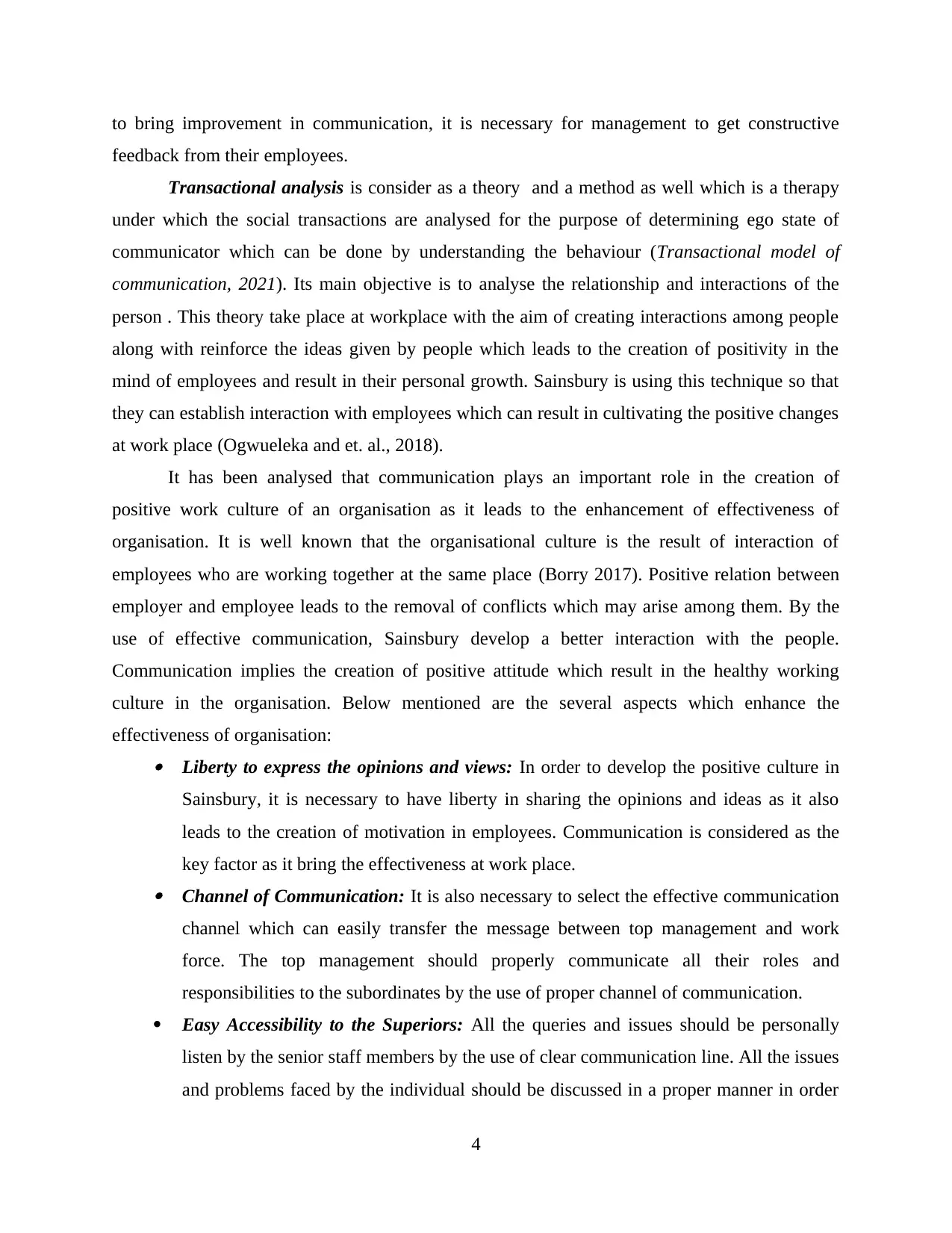
to bring improvement in communication, it is necessary for management to get constructive
feedback from their employees.
Transactional analysis is consider as a theory and a method as well which is a therapy
under which the social transactions are analysed for the purpose of determining ego state of
communicator which can be done by understanding the behaviour (Transactional model of
communication, 2021). Its main objective is to analyse the relationship and interactions of the
person . This theory take place at workplace with the aim of creating interactions among people
along with reinforce the ideas given by people which leads to the creation of positivity in the
mind of employees and result in their personal growth. Sainsbury is using this technique so that
they can establish interaction with employees which can result in cultivating the positive changes
at work place (Ogwueleka and et. al., 2018).
It has been analysed that communication plays an important role in the creation of
positive work culture of an organisation as it leads to the enhancement of effectiveness of
organisation. It is well known that the organisational culture is the result of interaction of
employees who are working together at the same place (Borry 2017). Positive relation between
employer and employee leads to the removal of conflicts which may arise among them. By the
use of effective communication, Sainsbury develop a better interaction with the people.
Communication implies the creation of positive attitude which result in the healthy working
culture in the organisation. Below mentioned are the several aspects which enhance the
effectiveness of organisation: Liberty to express the opinions and views: In order to develop the positive culture in
Sainsbury, it is necessary to have liberty in sharing the opinions and ideas as it also
leads to the creation of motivation in employees. Communication is considered as the
key factor as it bring the effectiveness at work place. Channel of Communication: It is also necessary to select the effective communication
channel which can easily transfer the message between top management and work
force. The top management should properly communicate all their roles and
responsibilities to the subordinates by the use of proper channel of communication.
Easy Accessibility to the Superiors: All the queries and issues should be personally
listen by the senior staff members by the use of clear communication line. All the issues
and problems faced by the individual should be discussed in a proper manner in order
4
feedback from their employees.
Transactional analysis is consider as a theory and a method as well which is a therapy
under which the social transactions are analysed for the purpose of determining ego state of
communicator which can be done by understanding the behaviour (Transactional model of
communication, 2021). Its main objective is to analyse the relationship and interactions of the
person . This theory take place at workplace with the aim of creating interactions among people
along with reinforce the ideas given by people which leads to the creation of positivity in the
mind of employees and result in their personal growth. Sainsbury is using this technique so that
they can establish interaction with employees which can result in cultivating the positive changes
at work place (Ogwueleka and et. al., 2018).
It has been analysed that communication plays an important role in the creation of
positive work culture of an organisation as it leads to the enhancement of effectiveness of
organisation. It is well known that the organisational culture is the result of interaction of
employees who are working together at the same place (Borry 2017). Positive relation between
employer and employee leads to the removal of conflicts which may arise among them. By the
use of effective communication, Sainsbury develop a better interaction with the people.
Communication implies the creation of positive attitude which result in the healthy working
culture in the organisation. Below mentioned are the several aspects which enhance the
effectiveness of organisation: Liberty to express the opinions and views: In order to develop the positive culture in
Sainsbury, it is necessary to have liberty in sharing the opinions and ideas as it also
leads to the creation of motivation in employees. Communication is considered as the
key factor as it bring the effectiveness at work place. Channel of Communication: It is also necessary to select the effective communication
channel which can easily transfer the message between top management and work
force. The top management should properly communicate all their roles and
responsibilities to the subordinates by the use of proper channel of communication.
Easy Accessibility to the Superiors: All the queries and issues should be personally
listen by the senior staff members by the use of clear communication line. All the issues
and problems faced by the individual should be discussed in a proper manner in order
4
⊘ This is a preview!⊘
Do you want full access?
Subscribe today to unlock all pages.

Trusted by 1+ million students worldwide
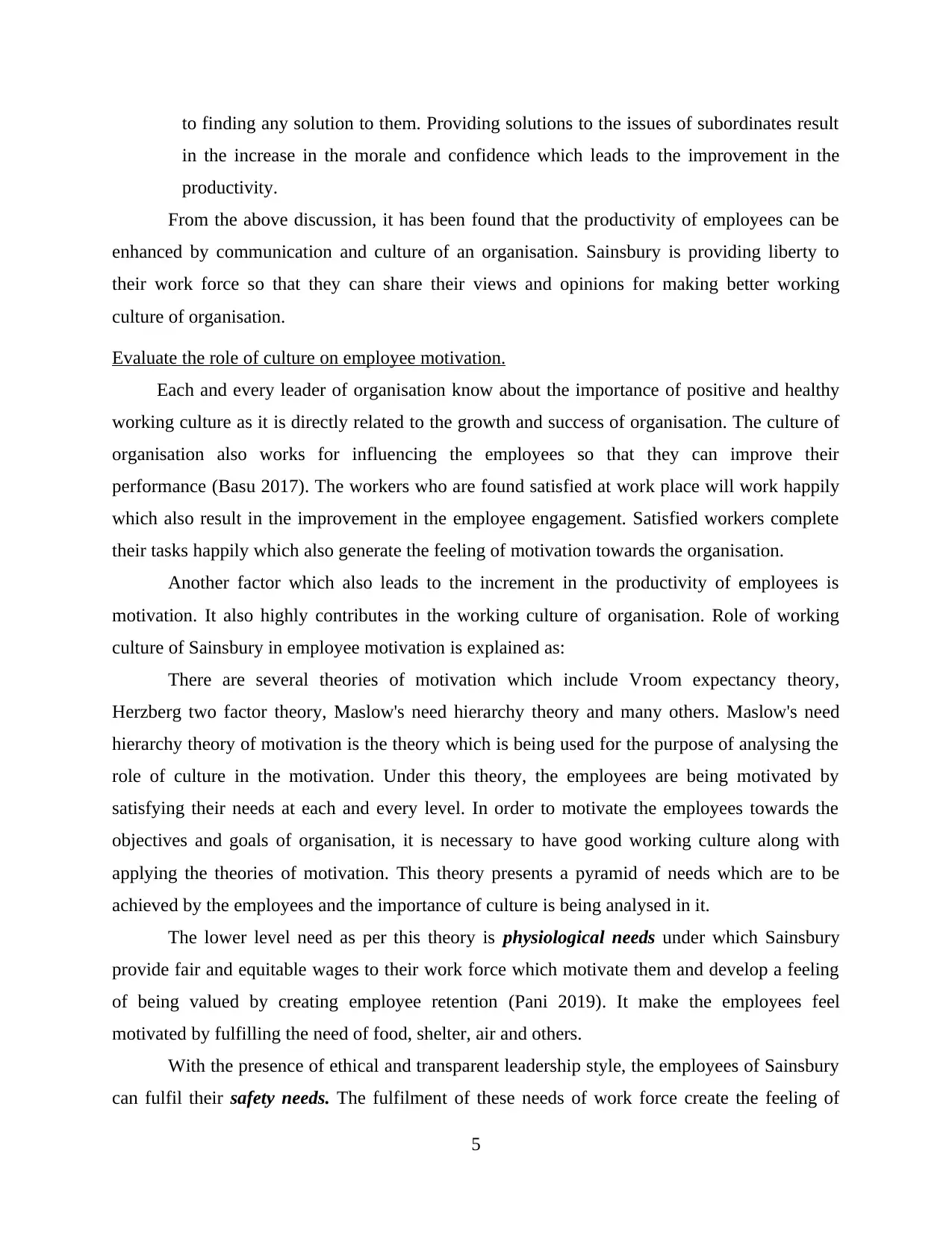
to finding any solution to them. Providing solutions to the issues of subordinates result
in the increase in the morale and confidence which leads to the improvement in the
productivity.
From the above discussion, it has been found that the productivity of employees can be
enhanced by communication and culture of an organisation. Sainsbury is providing liberty to
their work force so that they can share their views and opinions for making better working
culture of organisation.
Evaluate the role of culture on employee motivation.
Each and every leader of organisation know about the importance of positive and healthy
working culture as it is directly related to the growth and success of organisation. The culture of
organisation also works for influencing the employees so that they can improve their
performance (Basu 2017). The workers who are found satisfied at work place will work happily
which also result in the improvement in the employee engagement. Satisfied workers complete
their tasks happily which also generate the feeling of motivation towards the organisation.
Another factor which also leads to the increment in the productivity of employees is
motivation. It also highly contributes in the working culture of organisation. Role of working
culture of Sainsbury in employee motivation is explained as:
There are several theories of motivation which include Vroom expectancy theory,
Herzberg two factor theory, Maslow's need hierarchy theory and many others. Maslow's need
hierarchy theory of motivation is the theory which is being used for the purpose of analysing the
role of culture in the motivation. Under this theory, the employees are being motivated by
satisfying their needs at each and every level. In order to motivate the employees towards the
objectives and goals of organisation, it is necessary to have good working culture along with
applying the theories of motivation. This theory presents a pyramid of needs which are to be
achieved by the employees and the importance of culture is being analysed in it.
The lower level need as per this theory is physiological needs under which Sainsbury
provide fair and equitable wages to their work force which motivate them and develop a feeling
of being valued by creating employee retention (Pani 2019). It make the employees feel
motivated by fulfilling the need of food, shelter, air and others.
With the presence of ethical and transparent leadership style, the employees of Sainsbury
can fulfil their safety needs. The fulfilment of these needs of work force create the feeling of
5
in the increase in the morale and confidence which leads to the improvement in the
productivity.
From the above discussion, it has been found that the productivity of employees can be
enhanced by communication and culture of an organisation. Sainsbury is providing liberty to
their work force so that they can share their views and opinions for making better working
culture of organisation.
Evaluate the role of culture on employee motivation.
Each and every leader of organisation know about the importance of positive and healthy
working culture as it is directly related to the growth and success of organisation. The culture of
organisation also works for influencing the employees so that they can improve their
performance (Basu 2017). The workers who are found satisfied at work place will work happily
which also result in the improvement in the employee engagement. Satisfied workers complete
their tasks happily which also generate the feeling of motivation towards the organisation.
Another factor which also leads to the increment in the productivity of employees is
motivation. It also highly contributes in the working culture of organisation. Role of working
culture of Sainsbury in employee motivation is explained as:
There are several theories of motivation which include Vroom expectancy theory,
Herzberg two factor theory, Maslow's need hierarchy theory and many others. Maslow's need
hierarchy theory of motivation is the theory which is being used for the purpose of analysing the
role of culture in the motivation. Under this theory, the employees are being motivated by
satisfying their needs at each and every level. In order to motivate the employees towards the
objectives and goals of organisation, it is necessary to have good working culture along with
applying the theories of motivation. This theory presents a pyramid of needs which are to be
achieved by the employees and the importance of culture is being analysed in it.
The lower level need as per this theory is physiological needs under which Sainsbury
provide fair and equitable wages to their work force which motivate them and develop a feeling
of being valued by creating employee retention (Pani 2019). It make the employees feel
motivated by fulfilling the need of food, shelter, air and others.
With the presence of ethical and transparent leadership style, the employees of Sainsbury
can fulfil their safety needs. The fulfilment of these needs of work force create the feeling of
5
Paraphrase This Document
Need a fresh take? Get an instant paraphrase of this document with our AI Paraphraser
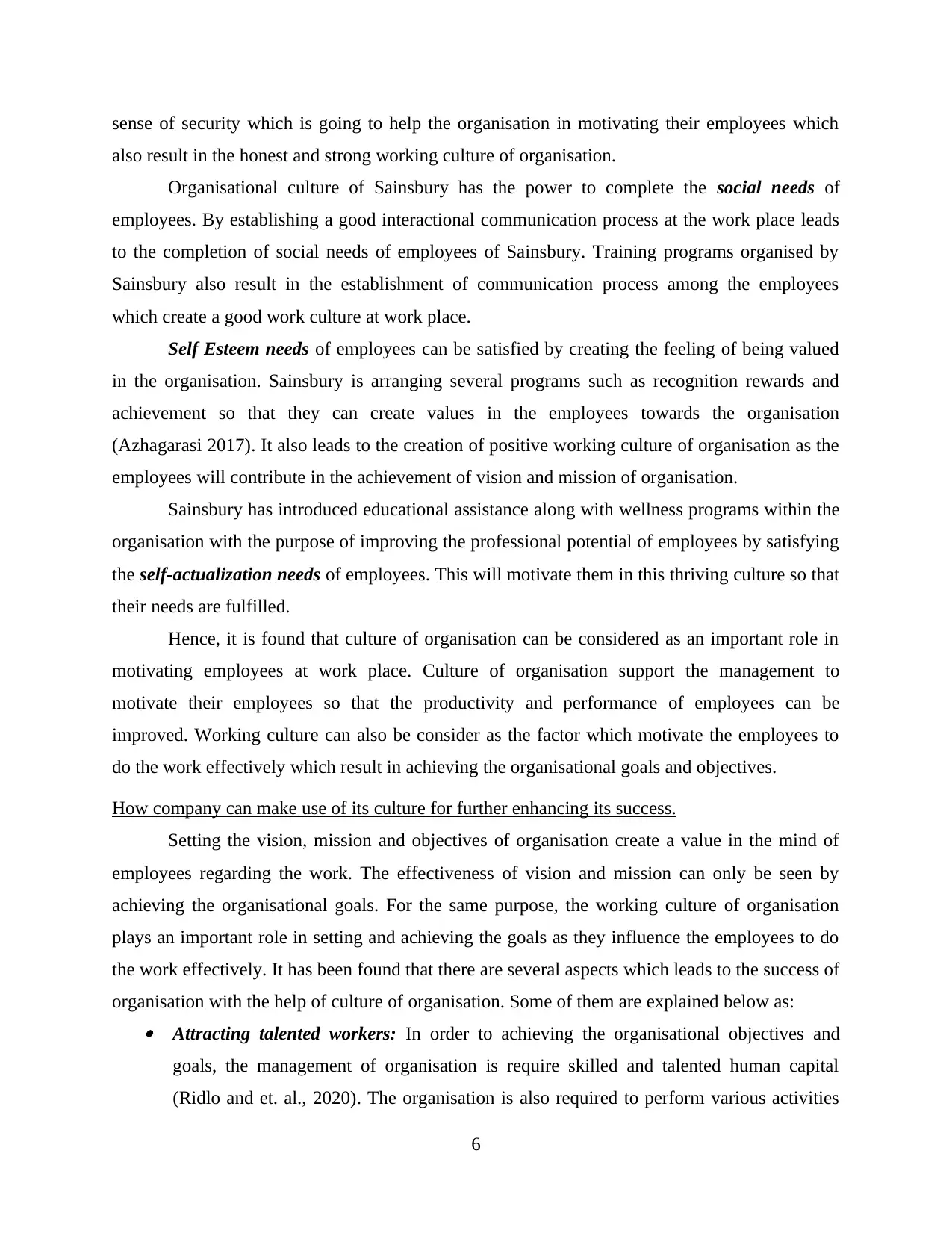
sense of security which is going to help the organisation in motivating their employees which
also result in the honest and strong working culture of organisation.
Organisational culture of Sainsbury has the power to complete the social needs of
employees. By establishing a good interactional communication process at the work place leads
to the completion of social needs of employees of Sainsbury. Training programs organised by
Sainsbury also result in the establishment of communication process among the employees
which create a good work culture at work place.
Self Esteem needs of employees can be satisfied by creating the feeling of being valued
in the organisation. Sainsbury is arranging several programs such as recognition rewards and
achievement so that they can create values in the employees towards the organisation
(Azhagarasi 2017). It also leads to the creation of positive working culture of organisation as the
employees will contribute in the achievement of vision and mission of organisation.
Sainsbury has introduced educational assistance along with wellness programs within the
organisation with the purpose of improving the professional potential of employees by satisfying
the self-actualization needs of employees. This will motivate them in this thriving culture so that
their needs are fulfilled.
Hence, it is found that culture of organisation can be considered as an important role in
motivating employees at work place. Culture of organisation support the management to
motivate their employees so that the productivity and performance of employees can be
improved. Working culture can also be consider as the factor which motivate the employees to
do the work effectively which result in achieving the organisational goals and objectives.
How company can make use of its culture for further enhancing its success.
Setting the vision, mission and objectives of organisation create a value in the mind of
employees regarding the work. The effectiveness of vision and mission can only be seen by
achieving the organisational goals. For the same purpose, the working culture of organisation
plays an important role in setting and achieving the goals as they influence the employees to do
the work effectively. It has been found that there are several aspects which leads to the success of
organisation with the help of culture of organisation. Some of them are explained below as: Attracting talented workers: In order to achieving the organisational objectives and
goals, the management of organisation is require skilled and talented human capital
(Ridlo and et. al., 2020). The organisation is also required to perform various activities
6
also result in the honest and strong working culture of organisation.
Organisational culture of Sainsbury has the power to complete the social needs of
employees. By establishing a good interactional communication process at the work place leads
to the completion of social needs of employees of Sainsbury. Training programs organised by
Sainsbury also result in the establishment of communication process among the employees
which create a good work culture at work place.
Self Esteem needs of employees can be satisfied by creating the feeling of being valued
in the organisation. Sainsbury is arranging several programs such as recognition rewards and
achievement so that they can create values in the employees towards the organisation
(Azhagarasi 2017). It also leads to the creation of positive working culture of organisation as the
employees will contribute in the achievement of vision and mission of organisation.
Sainsbury has introduced educational assistance along with wellness programs within the
organisation with the purpose of improving the professional potential of employees by satisfying
the self-actualization needs of employees. This will motivate them in this thriving culture so that
their needs are fulfilled.
Hence, it is found that culture of organisation can be considered as an important role in
motivating employees at work place. Culture of organisation support the management to
motivate their employees so that the productivity and performance of employees can be
improved. Working culture can also be consider as the factor which motivate the employees to
do the work effectively which result in achieving the organisational goals and objectives.
How company can make use of its culture for further enhancing its success.
Setting the vision, mission and objectives of organisation create a value in the mind of
employees regarding the work. The effectiveness of vision and mission can only be seen by
achieving the organisational goals. For the same purpose, the working culture of organisation
plays an important role in setting and achieving the goals as they influence the employees to do
the work effectively. It has been found that there are several aspects which leads to the success of
organisation with the help of culture of organisation. Some of them are explained below as: Attracting talented workers: In order to achieving the organisational objectives and
goals, the management of organisation is require skilled and talented human capital
(Ridlo and et. al., 2020). The organisation is also required to perform various activities
6
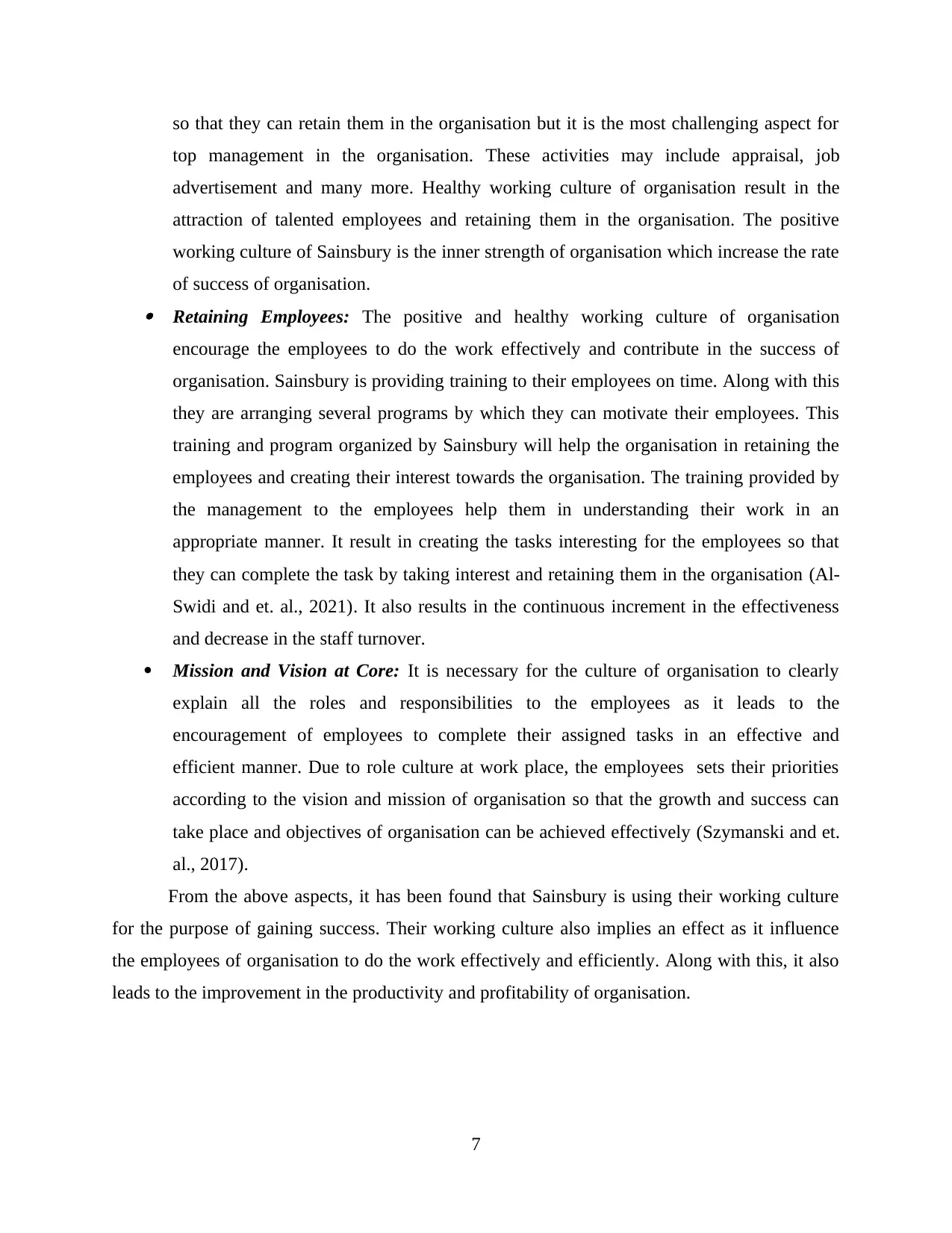
so that they can retain them in the organisation but it is the most challenging aspect for
top management in the organisation. These activities may include appraisal, job
advertisement and many more. Healthy working culture of organisation result in the
attraction of talented employees and retaining them in the organisation. The positive
working culture of Sainsbury is the inner strength of organisation which increase the rate
of success of organisation. Retaining Employees: The positive and healthy working culture of organisation
encourage the employees to do the work effectively and contribute in the success of
organisation. Sainsbury is providing training to their employees on time. Along with this
they are arranging several programs by which they can motivate their employees. This
training and program organized by Sainsbury will help the organisation in retaining the
employees and creating their interest towards the organisation. The training provided by
the management to the employees help them in understanding their work in an
appropriate manner. It result in creating the tasks interesting for the employees so that
they can complete the task by taking interest and retaining them in the organisation (Al-
Swidi and et. al., 2021). It also results in the continuous increment in the effectiveness
and decrease in the staff turnover.
Mission and Vision at Core: It is necessary for the culture of organisation to clearly
explain all the roles and responsibilities to the employees as it leads to the
encouragement of employees to complete their assigned tasks in an effective and
efficient manner. Due to role culture at work place, the employees sets their priorities
according to the vision and mission of organisation so that the growth and success can
take place and objectives of organisation can be achieved effectively (Szymanski and et.
al., 2017).
From the above aspects, it has been found that Sainsbury is using their working culture
for the purpose of gaining success. Their working culture also implies an effect as it influence
the employees of organisation to do the work effectively and efficiently. Along with this, it also
leads to the improvement in the productivity and profitability of organisation.
7
top management in the organisation. These activities may include appraisal, job
advertisement and many more. Healthy working culture of organisation result in the
attraction of talented employees and retaining them in the organisation. The positive
working culture of Sainsbury is the inner strength of organisation which increase the rate
of success of organisation. Retaining Employees: The positive and healthy working culture of organisation
encourage the employees to do the work effectively and contribute in the success of
organisation. Sainsbury is providing training to their employees on time. Along with this
they are arranging several programs by which they can motivate their employees. This
training and program organized by Sainsbury will help the organisation in retaining the
employees and creating their interest towards the organisation. The training provided by
the management to the employees help them in understanding their work in an
appropriate manner. It result in creating the tasks interesting for the employees so that
they can complete the task by taking interest and retaining them in the organisation (Al-
Swidi and et. al., 2021). It also results in the continuous increment in the effectiveness
and decrease in the staff turnover.
Mission and Vision at Core: It is necessary for the culture of organisation to clearly
explain all the roles and responsibilities to the employees as it leads to the
encouragement of employees to complete their assigned tasks in an effective and
efficient manner. Due to role culture at work place, the employees sets their priorities
according to the vision and mission of organisation so that the growth and success can
take place and objectives of organisation can be achieved effectively (Szymanski and et.
al., 2017).
From the above aspects, it has been found that Sainsbury is using their working culture
for the purpose of gaining success. Their working culture also implies an effect as it influence
the employees of organisation to do the work effectively and efficiently. Along with this, it also
leads to the improvement in the productivity and profitability of organisation.
7
⊘ This is a preview!⊘
Do you want full access?
Subscribe today to unlock all pages.

Trusted by 1+ million students worldwide
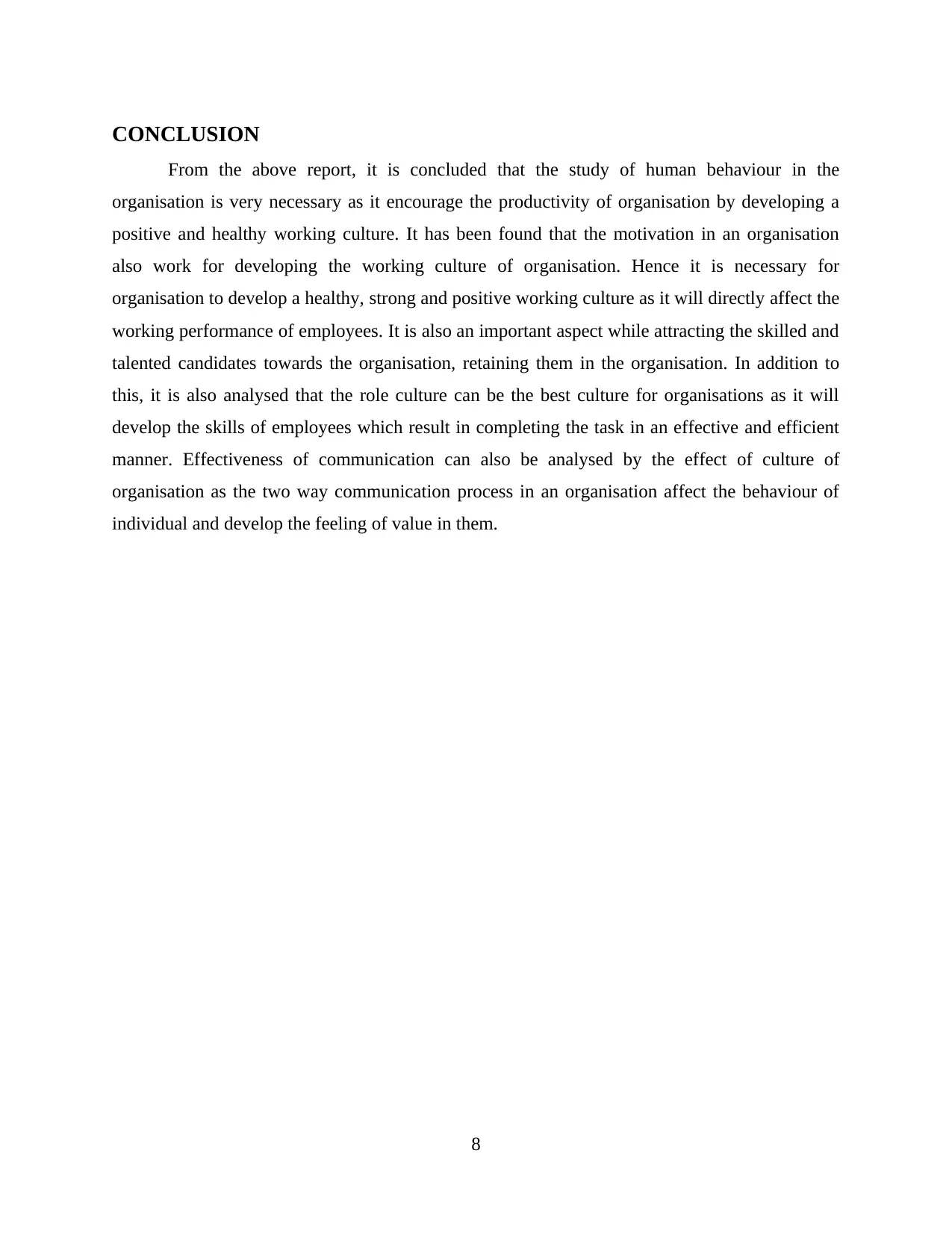
CONCLUSION
From the above report, it is concluded that the study of human behaviour in the
organisation is very necessary as it encourage the productivity of organisation by developing a
positive and healthy working culture. It has been found that the motivation in an organisation
also work for developing the working culture of organisation. Hence it is necessary for
organisation to develop a healthy, strong and positive working culture as it will directly affect the
working performance of employees. It is also an important aspect while attracting the skilled and
talented candidates towards the organisation, retaining them in the organisation. In addition to
this, it is also analysed that the role culture can be the best culture for organisations as it will
develop the skills of employees which result in completing the task in an effective and efficient
manner. Effectiveness of communication can also be analysed by the effect of culture of
organisation as the two way communication process in an organisation affect the behaviour of
individual and develop the feeling of value in them.
8
From the above report, it is concluded that the study of human behaviour in the
organisation is very necessary as it encourage the productivity of organisation by developing a
positive and healthy working culture. It has been found that the motivation in an organisation
also work for developing the working culture of organisation. Hence it is necessary for
organisation to develop a healthy, strong and positive working culture as it will directly affect the
working performance of employees. It is also an important aspect while attracting the skilled and
talented candidates towards the organisation, retaining them in the organisation. In addition to
this, it is also analysed that the role culture can be the best culture for organisations as it will
develop the skills of employees which result in completing the task in an effective and efficient
manner. Effectiveness of communication can also be analysed by the effect of culture of
organisation as the two way communication process in an organisation affect the behaviour of
individual and develop the feeling of value in them.
8
Paraphrase This Document
Need a fresh take? Get an instant paraphrase of this document with our AI Paraphraser
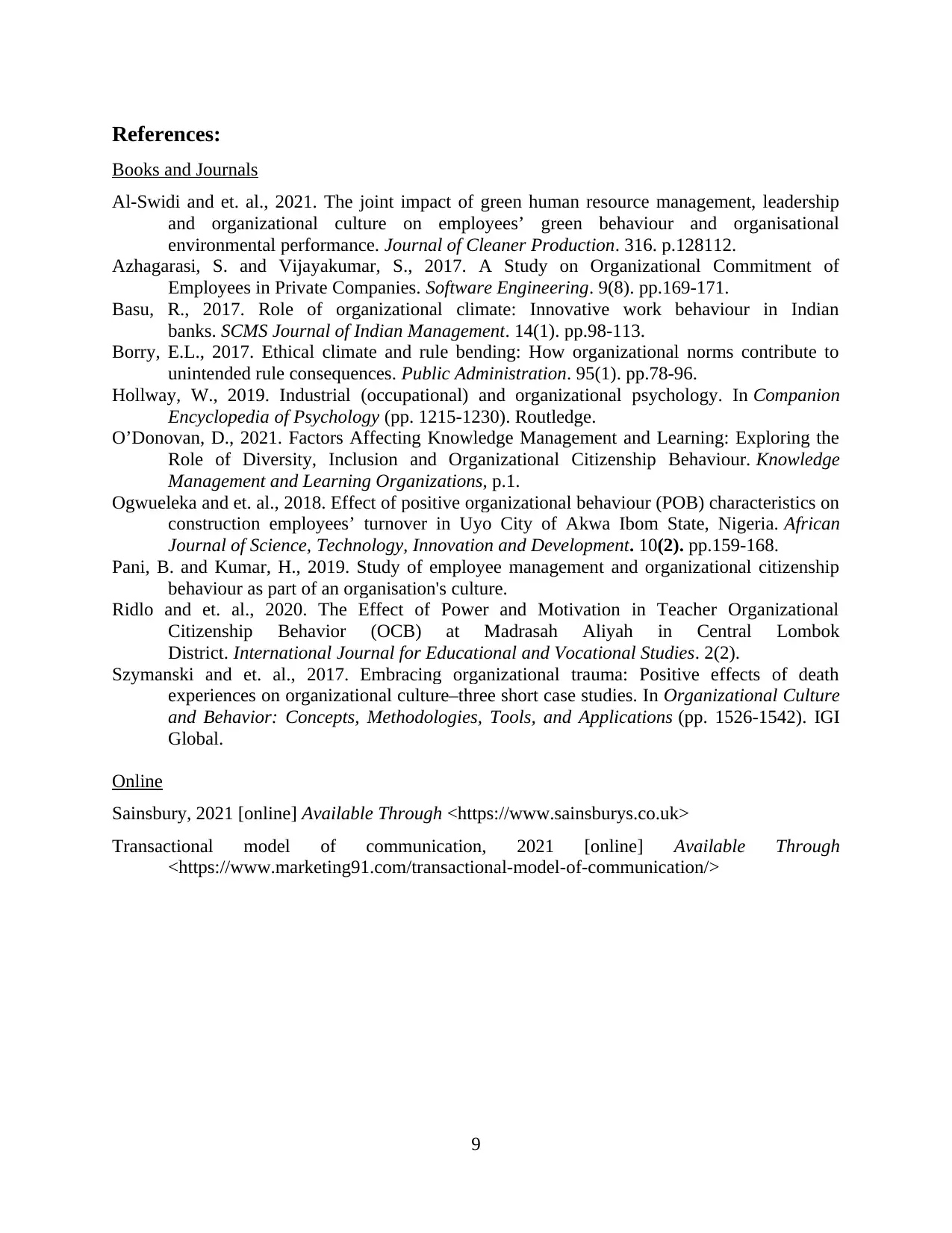
References:
Books and Journals
Al-Swidi and et. al., 2021. The joint impact of green human resource management, leadership
and organizational culture on employees’ green behaviour and organisational
environmental performance. Journal of Cleaner Production. 316. p.128112.
Azhagarasi, S. and Vijayakumar, S., 2017. A Study on Organizational Commitment of
Employees in Private Companies. Software Engineering. 9(8). pp.169-171.
Basu, R., 2017. Role of organizational climate: Innovative work behaviour in Indian
banks. SCMS Journal of Indian Management. 14(1). pp.98-113.
Borry, E.L., 2017. Ethical climate and rule bending: How organizational norms contribute to
unintended rule consequences. Public Administration. 95(1). pp.78-96.
Hollway, W., 2019. Industrial (occupational) and organizational psychology. In Companion
Encyclopedia of Psychology (pp. 1215-1230). Routledge.
O’Donovan, D., 2021. Factors Affecting Knowledge Management and Learning: Exploring the
Role of Diversity, Inclusion and Organizational Citizenship Behaviour. Knowledge
Management and Learning Organizations, p.1.
Ogwueleka and et. al., 2018. Effect of positive organizational behaviour (POB) characteristics on
construction employees’ turnover in Uyo City of Akwa Ibom State, Nigeria. African
Journal of Science, Technology, Innovation and Development. 10(2). pp.159-168.
Pani, B. and Kumar, H., 2019. Study of employee management and organizational citizenship
behaviour as part of an organisation's culture.
Ridlo and et. al., 2020. The Effect of Power and Motivation in Teacher Organizational
Citizenship Behavior (OCB) at Madrasah Aliyah in Central Lombok
District. International Journal for Educational and Vocational Studies. 2(2).
Szymanski and et. al., 2017. Embracing organizational trauma: Positive effects of death
experiences on organizational culture–three short case studies. In Organizational Culture
and Behavior: Concepts, Methodologies, Tools, and Applications (pp. 1526-1542). IGI
Global.
Online
Sainsbury, 2021 [online] Available Through <https://www.sainsburys.co.uk>
Transactional model of communication, 2021 [online] Available Through
<https://www.marketing91.com/transactional-model-of-communication/>
9
Books and Journals
Al-Swidi and et. al., 2021. The joint impact of green human resource management, leadership
and organizational culture on employees’ green behaviour and organisational
environmental performance. Journal of Cleaner Production. 316. p.128112.
Azhagarasi, S. and Vijayakumar, S., 2017. A Study on Organizational Commitment of
Employees in Private Companies. Software Engineering. 9(8). pp.169-171.
Basu, R., 2017. Role of organizational climate: Innovative work behaviour in Indian
banks. SCMS Journal of Indian Management. 14(1). pp.98-113.
Borry, E.L., 2017. Ethical climate and rule bending: How organizational norms contribute to
unintended rule consequences. Public Administration. 95(1). pp.78-96.
Hollway, W., 2019. Industrial (occupational) and organizational psychology. In Companion
Encyclopedia of Psychology (pp. 1215-1230). Routledge.
O’Donovan, D., 2021. Factors Affecting Knowledge Management and Learning: Exploring the
Role of Diversity, Inclusion and Organizational Citizenship Behaviour. Knowledge
Management and Learning Organizations, p.1.
Ogwueleka and et. al., 2018. Effect of positive organizational behaviour (POB) characteristics on
construction employees’ turnover in Uyo City of Akwa Ibom State, Nigeria. African
Journal of Science, Technology, Innovation and Development. 10(2). pp.159-168.
Pani, B. and Kumar, H., 2019. Study of employee management and organizational citizenship
behaviour as part of an organisation's culture.
Ridlo and et. al., 2020. The Effect of Power and Motivation in Teacher Organizational
Citizenship Behavior (OCB) at Madrasah Aliyah in Central Lombok
District. International Journal for Educational and Vocational Studies. 2(2).
Szymanski and et. al., 2017. Embracing organizational trauma: Positive effects of death
experiences on organizational culture–three short case studies. In Organizational Culture
and Behavior: Concepts, Methodologies, Tools, and Applications (pp. 1526-1542). IGI
Global.
Online
Sainsbury, 2021 [online] Available Through <https://www.sainsburys.co.uk>
Transactional model of communication, 2021 [online] Available Through
<https://www.marketing91.com/transactional-model-of-communication/>
9

10
⊘ This is a preview!⊘
Do you want full access?
Subscribe today to unlock all pages.

Trusted by 1+ million students worldwide
1 out of 17
Related Documents
Your All-in-One AI-Powered Toolkit for Academic Success.
+13062052269
info@desklib.com
Available 24*7 on WhatsApp / Email
![[object Object]](/_next/static/media/star-bottom.7253800d.svg)
Unlock your academic potential
Copyright © 2020–2026 A2Z Services. All Rights Reserved. Developed and managed by ZUCOL.





